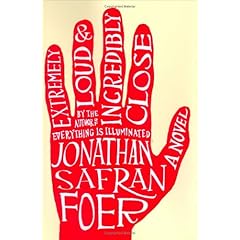 --The blurb--
--The blurb--"Nine-year-old Oskar Schell is an inventor, amateur entomologist, Francophile, letter writer, pacifist, natural historian, percussionist, romantic, Great Explorer, jeweller, detective, vegan, and collector of butterflies. When his father is killed in the September 11th attacks on the World Trade Centre, Oskar sets out to solve the mystery of a key he disovers in his father's closet. It is a search which leads him into the lives of strangers, through the five boroughs of New York, into history, to the bombings of Dresden and Hiroshima, and on an inward journey which brings him ever closer to some kind of peace."
--The review--
In keeping with Foer's earlier work, Everything Is Illuminated, it seems that in both, he is the kind of author you have to 'unwrap': the characters he creates are as complex as the emotions that are dealt with, and the books need to be read multiple times in order to peel back the layers. The characters take centre stage; the situations around which the plot is draped seem secondary and subsidiary props. Extremely Loud and Incredibly Close could arguably be summed up as one huge exercise in character development, and perhaps even more surprising than the book's base event (9/11) seeming of lesser importance than the characters themselves is the notion that the 'secondary' characters are of more interest than the main character himself. Oskar Schell is almost certainly autistic, though this is never mentioned, even though other hints that he is not 'normal' are certainly dropped. This in itself is fine, although I hope that following this and Mark Haddon's character (Christopher Boone, in The Curious Incident of the Dog in the Night-time ) there will not be a proliferation of young autistic protagonists, or else things will get quite tiring. However, I had extreme difficulty believing that Oskar was supposed to be a nine-year-old child, even if a particularly precocious autistic genius. Teenager? Yes. Nine years old? No way.
However, discarding this fact of age made the novel easier to read, and focusing on the other characters, such as Oskar's mother and grandmother, and the people he meets along the way, made it even easier. This is not to say there were not even further blips, such as a French mistake on the very first page (bad for a main character who is meant to be a Francophile) and the needless inclusion of Hiroshima (the inclusion of events at Dresden, however, was more understandable), but the general arc of the plot line was extremely varied, vivid and fully fleshed out, from Oskar's explorations of New York City to his grandmother's tiny and dark apartment (Foer, for all his weaknesses as a writer - Harry Seigel points out ways in which Foer shamelessly rips off other writers, for instance - is at least dexterous in his descriptions of setting). The dénouement is highly satisfactory, and the ending's incompleteness proves in fact to be its greatest strength, providing a high degree of realism to the grief suffered by Oskar and his family.
This is a story for anyone who has ever loved, or grieved; it is a story for those who just want something quick to read (a day and a half for me) and yet also a story for those able to commit to rereads and to unwrapping the characters further. The title is mentioned once, albeit not in its entirety, and the title itself is also well-chosen: as well as possibly describing what those who lost their lives in 9/11 may have been through, it also serves as a helpful descriptor for Oskar's grief, and perhaps indeed for anyone's grief. The novel, for all its flaws, is just as strong as Foer's debut, and while being recognisable as his, it is suitably different to show some form of progression. The prospect of where on earth he will go next as a writer is intriguing.
Other works by Jonathan Safran Foer
Joe (2006; with Hiroshi Sugimoto)
The Unabridged Pocketbook of Lightning (2005)
Everything Is Illuminated (2002)





No comments:
Post a Comment